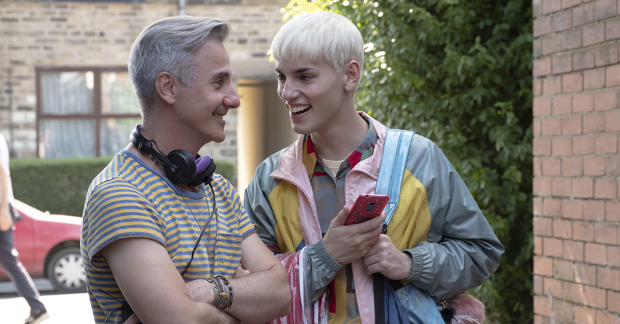Interview: Everybody's Talking About Max Harwood and Jonathan Butterell
The star and director of ”Everybody’s Talking About Jamie” discuss bringing this much-loved musical to the screen.
Two big firsts come along with the release of the Everybody's Talking About Jamie movie today. It's the first-ever professional acting gig for star Max Harwood, who takes on the title role, and the first-ever film directed by well-known stage director/choreographer Jonathan Butterell. Butterell has been involved with the project from the ground up, staging the theatrical version and making it a big, sparkly West End hit. The screen, he says, has allowed him to deepen his work, and he's got an ideal partner in Harwood, who embodies everything about the character with perfection.

(© John Rogers)
This conversation has been condensed and edited for clarity.
Everybody's Talking About Jamie is both of your first films — Max as an actor; Jonathan as a director. What was it like for you?
Max Harwood: It's wild. It's been a rollercoaster, for sure, but I couldn't have asked for a better creative team and project to do this with. I was such a huge fan of the show that it was really important to me to make sure that pre-existing fans of the show will love this film too. I felt so looked after throughout the whole process, not just creatively, but emotionally, and I'm so grateful.
Jonathan Butterell: I loved every second of it. It's a community I know deeply – it's essentially where I grew up, so I knew the scale of the world, and that's what cinema can do in a way that theater doesn't. I could literally go onto those streets and step into Jamie's imagination and let my mind run wild. I could have 3,000 people in a street of 500 people in an amazing nightclub. That sense of scale is what I loved playing with.
Max, tell me about meeting Jamie Campbell, whose real story inspired the documentary which in turn inspired the musical. How scary was it to know that Jamie was on set and that you were playing him?
Max: It was quite daunting stepping into a role based on someone who is alive. I knew Jamie loved the show and was in touch with [stage portrayers] John Macrae and Layton Williams, so I did feel pressure to…Not impress, but be respectful to his story and hope he would welcome me into the Jamie family, which he did. I met him in Sheffield when we were rehearsing – they filmed it. We went to a pub and had a chat. He's got an effervescent energy that is joyous. Jamie was on set and in and out during the shoot, but it was really lovely to get to know him and it was an amazing opportunity for my process as an actor.
Jonathan, the biggest change from the show is the introduction of Hugo — it's a fun production number on stage; here, it's a very emotional sequence where the character recounts several decades of gay history. Why make the change?
Jonathan: That particular sequence was fundamentally important. We knew that we had to take that story into the film and create that depth of character for Hugo. In the stage production, the audience isn't ready for that, rhythmically. In film, it was important that the story was passed onto Jamie's generation, because Dan, Tom, and I are of that generation.
Dan and Tom wrote an amazing song, "This Was Me," and we were so fortunate to have Holly Johnson come in and record it for us.
There's a segment in that sequence where there's a Section 28 march – Section 28 was a law passed in the '80s banning the promotion of homosexuality – and we went out in the streets to protest. There are two drag queens that pass through the camera, and that's Dan and Tom, and behind them, there's a woman in a wheelchair and a young boy with a placard that says, "My Mummy is a lesbian and I love her." The woman in the wheelchair is Dan's mum, and the little boy behind her was there to represent Dan, who was in those marches with that placard in his hand.
Why was it important for you to tell this story on screen?
Jonathan: All too often, the effeminate character is the comic sidekick or the villain, and Jamie wasn't going to be either. For me, it's a very simple story. It's about a young person taking their place in the world with courage and joy, and the community around them making a small shift in which they create a safe space for this person to do so. We wanted to create an effeminate hero who is not in a coming out story or a victim story. We hope it's universal, that everybody can say "This is me," whether you're male, female, transgender, young, old, or however you see or identify yourself.
Max: Jamie was me at school. I wasn't victimized, either. I didn't allow the dicks to do that to me and I gave it back as big as I got. I was lucky; I had the support of my friends. I didn't come out in school, but I definitely had fire in me that I wasn't going to allow people to tell me who I was, even if I didn't know myself at the time. It was just a joy to be able to play a role that was openly gay, unashamedly effeminate, and didn't die at the end of the film. Not that I would say those stories aren't important, but art reflects life, and it's time to allow queer people to tell stories about how we actually exist. It just felt very true to things I know to be true, and that's why I think so many people, queer or not, relate to it.







